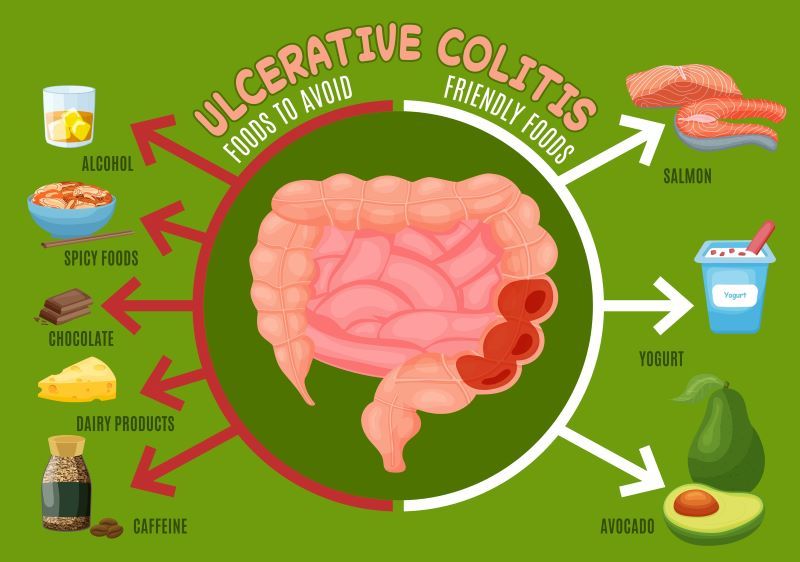Ulcerative Colitis (UC), a prominent member of the Irritable Bowel Syndrome family, brings inflammation right to the colon's doorstep, complicating digestion and daily comfort. Its symptoms vary widely among individuals and, if not addressed, can escalate into serious health complications, including increased risks of colorectal cancer and osteoporosis. While medications and surgeries play their roles in management, integrating specific foods into your diet can offer mild to moderate relief.

Specific Foods That May Aggravate UC Symptoms
1. Alcohol & Caffeine
- Alcohol: Beers, wines, and spirits can irritate the gut lining.
- Caffeine: Found in coffee, tea, some soft drinks, and chocolate, caffeine stimulates the gut and can exacerbate diarrhea.
2. Carbonated Beverages
- Sodas and Sparkling Waters: These can introduce excess gas into the digestive system, leading to discomfort and bloating.
3. Dairy Products (If Lactose Intolerant)
- Milk, Cheese, Ice Cream: These are common dairy items that can cause issues for those with lactose intolerance, leading to bloating, gas, and diarrhea.
4. High-Fiber Foods
- Whole Grains: Such as whole wheat bread, brown rice, and quinoa.
- Raw Vegetables: Especially cruciferous ones like broccoli, cauliflower, and Brussels sprouts.
- Legumes: Beans, lentils, and peas are high in fiber and can be difficult to digest during flare-ups.
5. Meats
- Red Meats: High in fat, these can be hard to digest.
- Processed Meats: Items like sausages and deli meats often contain additives that can irritate the gut.
6. Nuts and Crunchy Nut Butters
- Whole Nuts: Such as almonds, walnuts, and peanuts.
- Chunky Nut Butters: These retain pieces of nuts and can be difficult to digest.
7. Popcorn
- Its hard, indigestible kernels can irritate the colon.
8. Foods with Sorbitol
- Sugar-Free Gum and Candies: Sorbitol is an artificial sweetener that can cause gas and diarrhea.
9. Raw Fruits and Vegetables
- Fruits: Especially those with skins and seeds, like apples, berries, and grapes.
- Vegetables: Raw leafy greens can be particularly challenging to digest.
10. Refined Sugars
- Sweets and Desserts: High sugar content can disrupt the gut flora and exacerbate inflammation.
11. Seeds
- Found in foods like tomatoes, berries, and seeded breads, seeds can be problematic.
12. Spicy Foods
- Spices and spicy dishes can irritate the digestive tract and exacerbate symptoms.
Consulting with healthcare professionals can tailor a diet to your needs, ensuring you receive balanced nutrition while managing symptoms.
The Building Blocks of a Colitis-Friendly Diet
When UC rears its head, focusing on gentle, easily digestible foods can make all the difference:
Applesauce
Opt for unsweetened varieties to avoid sugar-induced inflammation. Homemade versions can offer a fresh, natural alternative.
Ripe Bananas and Canned Fruits
Soft, ripe bananas provide a safe source of carbohydrates and energy, while canned fruits like pears and peaches offer a less irritating fruit option.
Cooked Vegetables
Well-cooked vegetables such as carrots and spinach are rich in essential vitamins but should be softened to reduce fiber irritation.
Omega-3 Rich Fish
Salmon and other omega-3-rich fish not only offer high-quality protein but also help combat inflammation. Avoid frying to preserve nutritional value.
Yogurt
For those who are not lactose intolerant, yogurt with live cultures can support digestive health and provide a protein boost. Choose varieties without large fruit pieces to ease digestion.
White Rice with Turmeric
A bland diet staple, white rice can be enhanced with turmeric for its anti-inflammatory properties, offering flavor without irritation.
Lifestyle Tips for Managing UC
- Meal Planning: Smaller, frequent meals can be easier on the digestive system than larger ones.
- Supplementation: Essential supplements like calcium, folic acid, and vitamin B12 might be necessary if dietary restrictions limit their intake through food.
- Food Diary: Keeping track of what you eat can help identify triggers and tailor a diet that minimizes symptoms.
Final Thoughts
While Ulcerative Colitis can significantly impact life quality, strategic dietary choices, alongside medical treatment, can offer relief and improve daily living. Always consult healthcare professionals before making dietary changes to ensure they align with your health needs and treatment plan. With careful management, it's possible to live a fulfilling life despite UC's challenges.